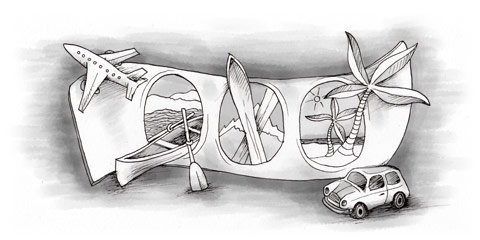1. Stop immediately. If possible, move your car off the road and keep your passengers and yourself off the road. If you have an accident (or a breakdown) on a freeway or other fast road, don’t stay in your vehicle whatever the weather (even if parked on the shoulder), as there’s a danger that another vehicle may run into you. Failing to stop after an accident, or failure to give particulars or report to the police is a serious offence. However, if you have an accident in a dangerous area, you should drive to the nearest police station to report it.
2. Warn other drivers of an obstruction by switching on your hazard warning lights (particularly on freeways). If necessary, for example when the road is partly or totally blocked, turn on your car’s headlights and direct traffic around the hazard. In bad visibility, at night, or in a blind spot, try to warn oncoming traffic of the danger, e.g. with a torch (flashlight) at night.
3. If anyone is injured, immediately telephone for an ambulance, the fire department (if someone is trapped or oil or chemicals are spilled) or the police, or get someone else to do it. Motorist aid call boxes with a direct line to the local highway patrol are located on some freeways and highways. Use them to request assistance for breakdowns and report hazards and accidents. Give first-aid only if you’re qualified to do so. Don’t move an injured person unless absolutely necessary to save him from further injury and don’t leave him alone except to telephone for an ambulance. Cover him with a blanket or coat to keep him warm.
4. There’s no requirement to report an accident to the police if there are no injuries or damage to property (other than your own). Calling the police to the scene of an accident may result in someone being booked for a driving offence. In all cases you mustn’t say anything that could be interpreted as an admission of guilt (even if you’ve ploughed into a stationary vehicle!). Don’t agree to pay for damages or sign any papers except a traffic ticket (which you must sign), before checking with your insurance company or an attorney. Let the police and insurance companies decide who was at fault.
5. If you or the other driver(s) involved decide to call the police, don’t move your vehicle or allow other vehicles to be moved. If it’s necessary to move vehicles to unblock the road, take photographs of the accident scene if a camera is available or make a drawing showing the positions of all vehicles involved before moving them.
6. Check immediately whether there are any witnesses to the accident and take their names and addresses, particularly noting those who support your version of events. If a motorist refuses to give his name, note his registration number. Write down the registration numbers of all vehicles involved and their drivers’ and owners’ names and addresses, vehicle registration certificate, driving licence and insurance details. You must by law also give these details to anyone having reasonable grounds for requiring them (e.g. anyone injured or the owner of damaged property). Don’t, however, reveal how much insurance cover you have. Note also the names and badge numbers of any police present.
7. All accidents involving death or bodily injury must usually be reported immediately to the local police, sheriff or highway patrol. If death, injury or property damage above a minimum amount, is involved, the safety-responsibility laws of most states require that you must also report the accident to the state Department of Motor Vehicles (DMV) and establish financial responsibility within a given period, e.g. 5 or 10 days. This is in addition to any report made to the police, highway patrol, or your insurance company. If you fail to report an accident, your driving licence may be suspended for a year. In general, you should report all accidents immediately to the local police, whether they’re called to the scene or not, and inquire about other reporting requirements. Make sure your report is officially recorded by the officer on duty and obtain a copy. If you have an accident involving a domestic animal (except a cat) and are unable to find the owner, it must also be reported to the local police. This also applies to certain wild animals, e.g. deer, which are a danger on rural roads, including some freeways.
8. If you’re arrested by the police, you aren’t required to make a statement, even if they ask for one. The best policy is not to say or sign anything until you’ve spoken to a lawyer and obtained legal advice.
9. Finally, you should report all accidents to your insurance company in writing as soon as possible, even if you don’t intend to make a claim (but reserve your right to make a claim later). Your insurance company asks you to complete an accident report form, which should be returned as soon as possible. The claim procedure depends on your insurance cover and that of anyone else involved in the accident.
In some areas you should be extremely wary of stopping at what looks like the scene of an accident, e.g. on a deserted highway, as accidents are sometimes staged to rob unsuspecting drivers (called highway hold-ups). You may, however, be obliged to note the location of the ‘accident’ and call for help from the first available telephone.
This article is an extract from Living and Working in America. Click here to get a copy now.

